MARIAN ANDERSON / Marian Anderson Mixtape
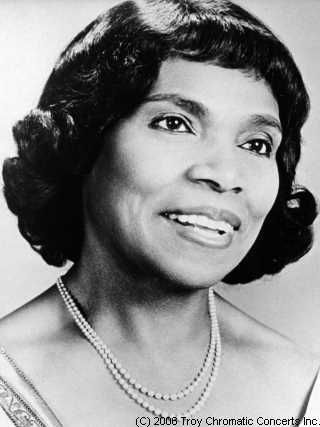 There is too much of our history we don’t know; and don’t even bring up the question of understanding. Beyond our ignorance is the awful truth: even if we knew we might not understand and moreover, certainly many historic achievements would not be to our present tastes. For example, the music of world renown contralto Marian Anderson.
I know some of her history. I understand, as the old folks say (making an agricultural reference) the hard row she was forced to hoe. I’m city but my daddy was country born and bred. He taught us to grow food in the city. I understand that farming ain’t no joke. I understand the tremendous accomplishments of Marian Anderson.
But admiration and understanding not withstanding, I am not a big fan of her music.
There is too much of our history we don’t know; and don’t even bring up the question of understanding. Beyond our ignorance is the awful truth: even if we knew we might not understand and moreover, certainly many historic achievements would not be to our present tastes. For example, the music of world renown contralto Marian Anderson.
I know some of her history. I understand, as the old folks say (making an agricultural reference) the hard row she was forced to hoe. I’m city but my daddy was country born and bred. He taught us to grow food in the city. I understand that farming ain’t no joke. I understand the tremendous accomplishments of Marian Anderson.
But admiration and understanding not withstanding, I am not a big fan of her music.
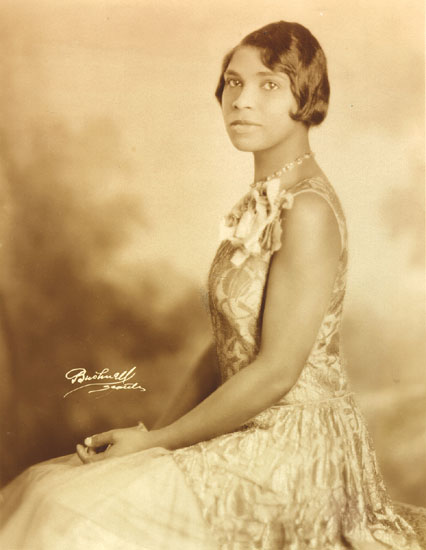 Marian Anderson was born in Philadelphia at the tail end of the nineteenth century, February 27, 1897 (according to her birth certificate, she often offered February 17, 1902). By the time she was ten or eleven her father had died. And though a second-hand piano had been purchased when she was eight years old, and although she taught herself to play a little piano (mainly as a result of passing a window one day when she was walking down a street, heard some beautiful piano music, looked in and saw a dark-skinned black woman at the piano thereby directly inspiring young Marian to believe she could do the same), and although she sang regularly in church, she still was a little black girl with a deep voice and an uncertain future in a deeply racist United States of America.
Some of us may think not much has changed but that would only be because we don’t have a firm grasp of exactly how limited and limiting pre-sixties (pre-Civil Rights and pre-voting rights) America was. Regardless of her talent, legally she was treated at best as a second-class citizen.
Marian Anderson was born in Philadelphia at the tail end of the nineteenth century, February 27, 1897 (according to her birth certificate, she often offered February 17, 1902). By the time she was ten or eleven her father had died. And though a second-hand piano had been purchased when she was eight years old, and although she taught herself to play a little piano (mainly as a result of passing a window one day when she was walking down a street, heard some beautiful piano music, looked in and saw a dark-skinned black woman at the piano thereby directly inspiring young Marian to believe she could do the same), and although she sang regularly in church, she still was a little black girl with a deep voice and an uncertain future in a deeply racist United States of America.
Some of us may think not much has changed but that would only be because we don’t have a firm grasp of exactly how limited and limiting pre-sixties (pre-Civil Rights and pre-voting rights) America was. Regardless of her talent, legally she was treated at best as a second-class citizen.
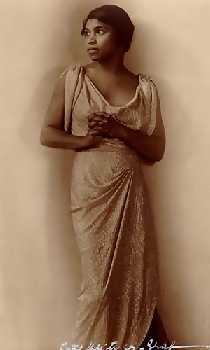 We can cavalierly say that none of that matters because her talent shone through. We can say it and we would be dead wrong. Marian Anderson did not succeed simply because of her considerable talents. She succeeded because of two major factors: one she understood the social conditions with which she had to deal, and two she left the United States to make her mark.
Yes, there were people who helped her every step of the way. Friends who helped pay for her music education. A vocal teacher, Giuseppe Boghetti, who trained her and counseled her. This is how you breathe; even though you love opera set your sights on concert singing because you will not be accepted in the opera world.
We must remember America had not yet completed the Garvey Era (too often mistakenly referred to as the Harlem Renaissance), the whole country had not yet gone through the great depression. Lynching was so popular that mobs produced post cards of the gruesomely festive affairs. Here was this black girl, gifted with the deep voice trying to make it in the white world of European classical music.
Her first major concert at Town Hall, New York City in 1924 was a disaster. She sang both classical and Negro spirituals. The audience was small and the critics were not amused nor impressed. She returned home to Philadelphia and almost quit. Instead of the dreamed of accolades, she was forced to suffer rejection.
We can cavalierly say that none of that matters because her talent shone through. We can say it and we would be dead wrong. Marian Anderson did not succeed simply because of her considerable talents. She succeeded because of two major factors: one she understood the social conditions with which she had to deal, and two she left the United States to make her mark.
Yes, there were people who helped her every step of the way. Friends who helped pay for her music education. A vocal teacher, Giuseppe Boghetti, who trained her and counseled her. This is how you breathe; even though you love opera set your sights on concert singing because you will not be accepted in the opera world.
We must remember America had not yet completed the Garvey Era (too often mistakenly referred to as the Harlem Renaissance), the whole country had not yet gone through the great depression. Lynching was so popular that mobs produced post cards of the gruesomely festive affairs. Here was this black girl, gifted with the deep voice trying to make it in the white world of European classical music.
Her first major concert at Town Hall, New York City in 1924 was a disaster. She sang both classical and Negro spirituals. The audience was small and the critics were not amused nor impressed. She returned home to Philadelphia and almost quit. Instead of the dreamed of accolades, she was forced to suffer rejection.
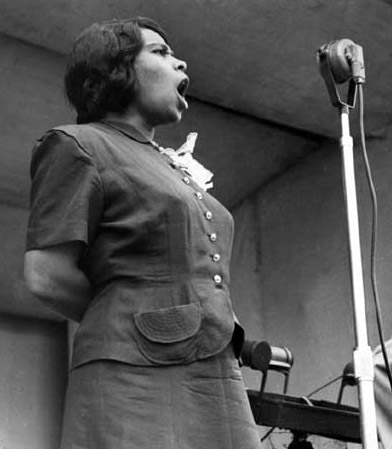 But getting knocked down was the norm for Negro aspirations; the real question was: are you going to get up and continue fighting. She returned to the fray, in 1925 competing against over 250 other contestants, she won first place in the Lewisohn Stadium competition and sang with the Philharmonic Orchestra in New York City. It was a triumph.
Afterwards she was signed by Arthur Judson, a leading impresario, who organized major national tours. Even though her fame increased she still couldn’t stay in southern hotels nor eat in the restaurants. Then in 1930 the National Association of Negro Musicians awarded her a scholarship to study in London. When she returned, a fellowship from the Julius Rosenwald Fund, enabled her to study and perform in Berlin, where she again triumphed. Scandinavian producers then contracted her to appear in Sweden, Finland, and other Nordic countries.
She did an extensive tour that included command performances for King Gustav in Stockholm, Sweden and King Christian in Copenhagen, Denmark. In Finland she enthralled classical composer Jean Sibelius, who arranged and wrote music specifically for Marian Anderson. Her touring ended in 1935 with a major concert in Salzburg, Austria. The famous conductor Arturo Toscanini was present and proclaimed afterwards, “yours is a voice such as one hears once in a hundred years.”
But getting knocked down was the norm for Negro aspirations; the real question was: are you going to get up and continue fighting. She returned to the fray, in 1925 competing against over 250 other contestants, she won first place in the Lewisohn Stadium competition and sang with the Philharmonic Orchestra in New York City. It was a triumph.
Afterwards she was signed by Arthur Judson, a leading impresario, who organized major national tours. Even though her fame increased she still couldn’t stay in southern hotels nor eat in the restaurants. Then in 1930 the National Association of Negro Musicians awarded her a scholarship to study in London. When she returned, a fellowship from the Julius Rosenwald Fund, enabled her to study and perform in Berlin, where she again triumphed. Scandinavian producers then contracted her to appear in Sweden, Finland, and other Nordic countries.
She did an extensive tour that included command performances for King Gustav in Stockholm, Sweden and King Christian in Copenhagen, Denmark. In Finland she enthralled classical composer Jean Sibelius, who arranged and wrote music specifically for Marian Anderson. Her touring ended in 1935 with a major concert in Salzburg, Austria. The famous conductor Arturo Toscanini was present and proclaimed afterwards, “yours is a voice such as one hears once in a hundred years.”
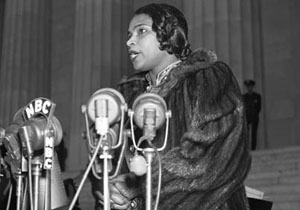
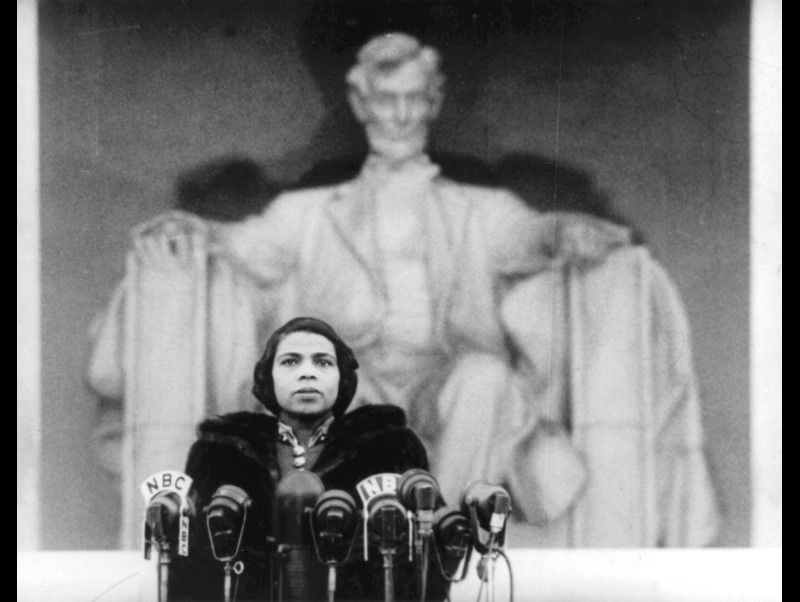 It is poetic justice that in 1943 she did a benefit for Chinese relief at Constitution Hall with the stipulation that segregated seating was unacceptable. They suspended their racist policy for her performance. You could delay her, but you couldn’t stop her.
Many years later after supporting the war efforts of the country even though she was denied full access to cultural and public accommodations, Marian Anderson continued to perform and continued to spearhead challenges to racism. By 1950 she refused to give concerts anywhere that did not have racially desegregated, open seating. She sang at the inauguration of Presidents Eisenhower and Kennedy, and was a featured vocalist at the March on Washington.
Her is a quote that perfectly illustrates her outlook: “If I were inclined to be combative, I suppose I might insist on making an issue of these things. But that is not my nature, and I always bear in mind that my mission is to leave behind me the kind of impression that will make it easier for those who follow.”
Although she could have disappeared into the world of European classical music, Marian Anderson made two important choices. First she decided to use her music as a means of achieving racial equality even though she could have moved to Europe and been lionized there. Second, and even more important, although she loved classical music, she also loved and deeply respected her own cultural treasures.
It is poetic justice that in 1943 she did a benefit for Chinese relief at Constitution Hall with the stipulation that segregated seating was unacceptable. They suspended their racist policy for her performance. You could delay her, but you couldn’t stop her.
Many years later after supporting the war efforts of the country even though she was denied full access to cultural and public accommodations, Marian Anderson continued to perform and continued to spearhead challenges to racism. By 1950 she refused to give concerts anywhere that did not have racially desegregated, open seating. She sang at the inauguration of Presidents Eisenhower and Kennedy, and was a featured vocalist at the March on Washington.
Her is a quote that perfectly illustrates her outlook: “If I were inclined to be combative, I suppose I might insist on making an issue of these things. But that is not my nature, and I always bear in mind that my mission is to leave behind me the kind of impression that will make it easier for those who follow.”
Although she could have disappeared into the world of European classical music, Marian Anderson made two important choices. First she decided to use her music as a means of achieving racial equality even though she could have moved to Europe and been lionized there. Second, and even more important, although she loved classical music, she also loved and deeply respected her own cultural treasures.
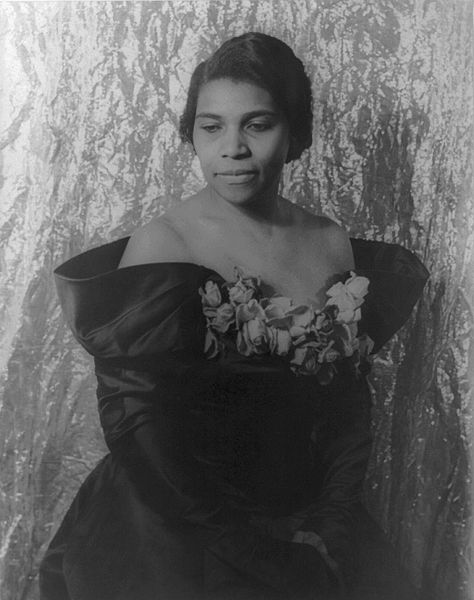 In addition to the European repertoire of classical, lieder and opera, Marian Anderson always included Negro spirituals in her concerts. Indeed, very early on when she went to audition to become a student of Boghetti, she won the opportunity not by singing opera but by singing “Deep River.” The performance is said to have moved Mr. Boghetti to tears.
Marian Anderson made it possible for other black people to go further in the world of opera and other forms of classical music. Indeed, Anderson had options. On January 7, 1955 she debuted at the Metropolitan Opera in New York City where she was accepted as a full member of the opera. Although she could have continued on stage in New York, she elected to continue her career as a concert singer.
In addition to the European repertoire of classical, lieder and opera, Marian Anderson always included Negro spirituals in her concerts. Indeed, very early on when she went to audition to become a student of Boghetti, she won the opportunity not by singing opera but by singing “Deep River.” The performance is said to have moved Mr. Boghetti to tears.
Marian Anderson made it possible for other black people to go further in the world of opera and other forms of classical music. Indeed, Anderson had options. On January 7, 1955 she debuted at the Metropolitan Opera in New York City where she was accepted as a full member of the opera. Although she could have continued on stage in New York, she elected to continue her career as a concert singer.
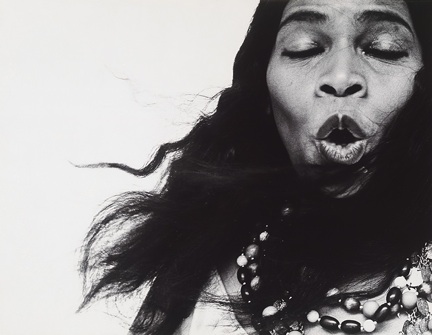 She was the first black to achieve full membership in the Metropolitan Opera. Moreover, she opened the doors for many more who followed her. She recorded both classical music and spirituals. She honored both her love of opera and her love of her people. Whether one likes her singing in the European style is a matter of personal taste. But it would be in poor taste not to know about and appreciate the tremendous talents and dedication of Marian Anderson.
—Kalamu ya Salaam
Marian Anderson Mixtape Playlist
She was the first black to achieve full membership in the Metropolitan Opera. Moreover, she opened the doors for many more who followed her. She recorded both classical music and spirituals. She honored both her love of opera and her love of her people. Whether one likes her singing in the European style is a matter of personal taste. But it would be in poor taste not to know about and appreciate the tremendous talents and dedication of Marian Anderson.
—Kalamu ya Salaam
Marian Anderson Mixtape Playlist
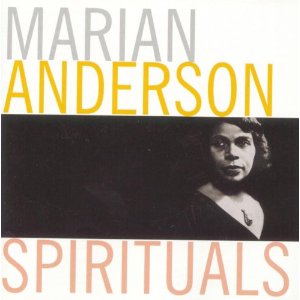 Spirituals
01 “He's Got the Whole World in His Hands”
02 “Go Down, Moses”
Spirituals
01 “He's Got the Whole World in His Hands”
02 “Go Down, Moses”
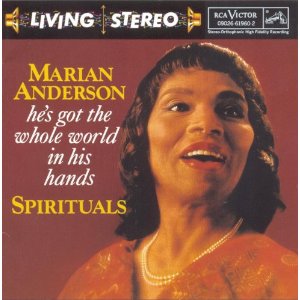 He’s Got The Whole World In His Hands
03 “Scandalize My Name”
04 “Introduction”
05 “Oh, Heaven Is One Beautiful Place, I Know”
06 “I Been in de Storm So Long”
07 “Sometimes I Feel Like a Motherless Child”
He’s Got The Whole World In His Hands
03 “Scandalize My Name”
04 “Introduction”
05 “Oh, Heaven Is One Beautiful Place, I Know”
06 “I Been in de Storm So Long”
07 “Sometimes I Feel Like a Motherless Child”
This entry was posted on Monday, May 23rd, 2011 at 2:29 pm and is filed under Classic. You can follow any responses to this entry through the RSS 2.0 feed. You can leave a response, or trackback from your own site.
4 Responses to “MARIAN ANDERSON / Marian Anderson Mixtape”
May 23rd, 2011 at 10:31 pm
i know of Marian Anderson for obvious reasons. I skimmed the essay, started the audio and moved on to the next essay. On listening, I had to come back and download the mp3. I had forgotten how much I loved her voice. Thanks!
February 6th, 2012 at 2:43 pm
I think that marian anderson has the best pictures ever and mixtape
Leave a Reply
| top |